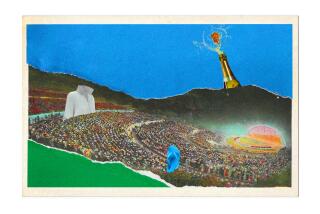Basie’s spirit, not his playlist
- Share via
Celebrating the Count Basie centennial (he was born Aug. 21, 1904) was one of the better thematic ideas in the summer’s Jazz at the Hollywood Bowl series. But the devil, as usual, was in the details, and Wednesday night’s program only intermittently lived up to expectations.
Placing the Count Basie Orchestra in the opening segment made sense. Two decades after his passing in 1984, the ensemble that continues to play Basie’s music is one of the most viable of the so-called ghost bands (groups that remain active after the original leader’s death). This collective, led by trombonist Bill Hughes, played with a solid grasp of the unique Basie combination of in-the-pocket rhythm, powerful brass and lush saxophones.
But why in the world would their set list be almost completely lacking in classic Basie hits? Why play such atypical numbers as “Paris Blues” (despite a fine alto saxophone solo from Jackie Kelso) and devote three songs to vocalist Chris Murrell while omitting such memorable Basie items as “Lil’ Darlin’,” “April in Paris,” “Jumpin’ at the Woodside” and “Shiny Stockings”? An odd way to do a tribute.
The show’s second half veered even further from the Basie center as the orchestra was joined by more guest singers. Dianne Reeves offered a lovely take on “Skylark” and scatted with her usual verve. Ernestine Anderson affirmed her blues roots, especially during her sardonic, rapping version of “Never Make Your Move Too Soon.” And Diane Schuur applied her edgy soprano -- penetrating enough to drill through titanium -- to a self-focused blues and a pair of inspirational numbers.
Fortunately, the show also featured Jon Hendricks, whose affection for the honoree was evident in every note he sang, even though he elected to do none of the Basie-related numbers that were rendered so superbly by his legendary trio with Annie Ross and Dave Lambert. Even so, Hendricks, who’s 82 and still filled with the joy of jazz, brought authenticity, inventiveness and musical presence to the evening -- the same qualities that made Count Basie one of theicons of 20th century American music.
More to Read
The biggest entertainment stories
Get our big stories about Hollywood, film, television, music, arts, culture and more right in your inbox as soon as they publish.
You may occasionally receive promotional content from the Los Angeles Times.










